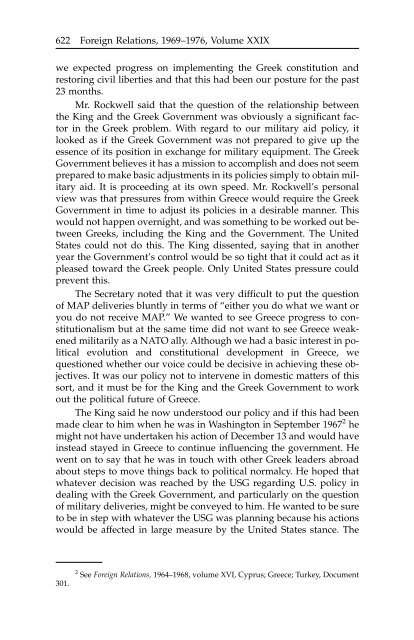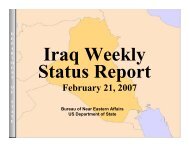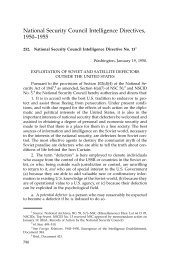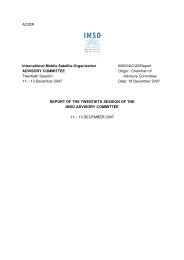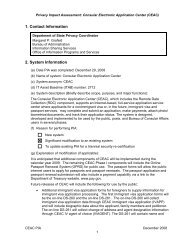Greece - US Department of State
Greece - US Department of State
Greece - US Department of State
You also want an ePaper? Increase the reach of your titles
YUMPU automatically turns print PDFs into web optimized ePapers that Google loves.
622 Foreign Relations, 1969–1976, Volume XXIX<br />
we expected progress on implementing the Greek constitution and<br />
restoring civil liberties and that this had been our posture for the past<br />
23 months.<br />
Mr. Rockwell said that the question <strong>of</strong> the relationship between<br />
the King and the Greek Government was obviously a significant factor<br />
in the Greek problem. With regard to our military aid policy, it<br />
looked as if the Greek Government was not prepared to give up the<br />
essence <strong>of</strong> its position in exchange for military equipment. The Greek<br />
Government believes it has a mission to accomplish and does not seem<br />
prepared to make basic adjustments in its policies simply to obtain military<br />
aid. It is proceeding at its own speed. Mr. Rockwell’s personal<br />
view was that pressures from within <strong>Greece</strong> would require the Greek<br />
Government in time to adjust its policies in a desirable manner. This<br />
would not happen overnight, and was something to be worked out between<br />
Greeks, including the King and the Government. The United<br />
<strong>State</strong>s could not do this. The King dissented, saying that in another<br />
year the Government’s control would be so tight that it could act as it<br />
pleased toward the Greek people. Only United <strong>State</strong>s pressure could<br />
prevent this.<br />
The Secretary noted that it was very difficult to put the question<br />
<strong>of</strong> MAP deliveries bluntly in terms <strong>of</strong> “either you do what we want or<br />
you do not receive MAP.” We wanted to see <strong>Greece</strong> progress to constitutionalism<br />
but at the same time did not want to see <strong>Greece</strong> weakened<br />
militarily as a NATO ally. Although we had a basic interest in political<br />
evolution and constitutional development in <strong>Greece</strong>, we<br />
questioned whether our voice could be decisive in achieving these objectives.<br />
It was our policy not to intervene in domestic matters <strong>of</strong> this<br />
sort, and it must be for the King and the Greek Government to work<br />
out the political future <strong>of</strong> <strong>Greece</strong>.<br />
The King said he now understood our policy and if this had been<br />
made clear to him when he was in Washington in September 1967 2 he<br />
might not have undertaken his action <strong>of</strong> December 13 and would have<br />
instead stayed in <strong>Greece</strong> to continue influencing the government. He<br />
went on to say that he was in touch with other Greek leaders abroad<br />
about steps to move things back to political normalcy. He hoped that<br />
whatever decision was reached by the <strong>US</strong>G regarding U.S. policy in<br />
dealing with the Greek Government, and particularly on the question<br />
<strong>of</strong> military deliveries, might be conveyed to him. He wanted to be sure<br />
to be in step with whatever the <strong>US</strong>G was planning because his actions<br />
would be affected in large measure by the United <strong>State</strong>s stance. The<br />
2<br />
See Foreign Relations, 1964–1968, volume XVI, Cyprus; <strong>Greece</strong>; Turkey, Document<br />
301.


